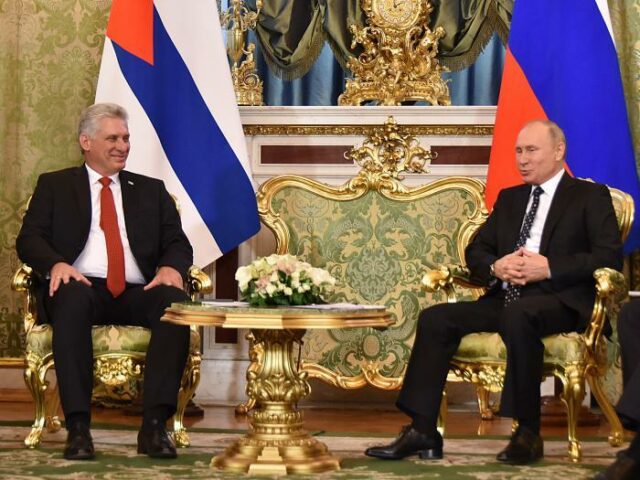
Russia’s New Foreign Policy Orientation
Publication: Eurasia Daily Monitor Volume: 20 Issue: 4
By:

In the wake of growing isolation due to its aggression against Ukraine, Russia’s foreign policy leadership and brain trust have elaborated a new ideology and self-identification that is meant to guide Moscow’s foreign policy moving forward. This orientation rejects Russia’s post-Petrine identification as a European state, claiming instead an “Asia-centric identity” that is associated with refocusing foreign policy priorities toward the Global South, including Asia, Africa and Latin America (Valdaiclub.com, December 19, 2022).
This new intellectual formation begins with the postulate, stated by Russian President Vladimir Putin, Defense Minister Sergei Shoigu and a raft of subservient intellectuals, that the “collective West” wants to “tear Russia apart” (i.e., so-called historical Russia, which for Putin represents the Soviet Union) and has been waging war against its American leadership for years (Mid.ru, September 21, 2022; Kremlin.ru, December 22, 2022; International Business Times, December 25, 2022). Indeed, in the Kremlin’s view, all North Atlantic Treaty Organization members contribute virtually their entire military capabilities to the fight against Russia (Sputnik News, December 21, 2022; Kremlin.ru, December 21, 2022). Therefore, the current war has been forced on Moscow, which has no choice but to fight if it wishes to survive. However, this anti-Russian war, allegedly originating from a desperate effort to reverse the course of history, sustains Western hegemony and suppresses Russia’s revival as a great global power in the inevitable multipolar world that is starting to emerge (Mid.ru, September 21, 2022).
Indeed, according to ranking officials, such as Russian Foreign Minister Sergey Lavrov, the main reason for these growing tensions is the supposedly stubborn desire of the “collective West,” by hook or crook, to maintain its historically elusive dominance in the international arena. Nevertheless, it is impossible to slow down the inevitable, as we are witnessing the increasingly visible growth of new power centers in Asia, Africa and Latin America (Mid.ru, December 14, 2022).
Moreover, Russia, by virtue of its previous foreign policy choices and economic profile abroad, is already in a position to minimize the impact of Western sanctions. Thus, Putin has frequently remarked that Russia will reorient its energy, fertilizer, grain and other exports to the Global South (Kremlin.ru, December 15, 2022). Meanwhile, Moscow is not losing out on opportunities to strengthen its position and defame Western policies in these countries. As such, it regularly charges the West with seeking to intervene in the domestic affairs of the Global South and steadfastly insists that “we stand for the right of states to choose their political and economic partners, to follow their own values and civilizational path of development without fear of being punished. Russia offers honest, mutually beneficial and equal cooperation without punitive measures, unilateral sanctions or interference in internal affairs” (Mid.ru, December 16, 2022).
In the Kremlin’s view, this new economic orientation reflects the shift in the fundamental center of international economic dynamism to Eurasia, a term that eludes precise definition but invariably is coterminous with Russia and the former Soviet Union (Mid.ru, December 14, 2022). In addition, this trend necessarily dictates a close international economic, if not political, relationship comprising of not only Russia but also the Eurasian Economic Union and China. Accordingly, Russian foreign policy elites celebrate any country’s accession to the BRICS format (a loose arrangement of Brazil, Russia, India, China and South Africa). For instance, Saudi Arabia’s expressed interest in doing so was seen as validating for Russian foreign policy assertions about Riyadh’s drift away from the West (Globalaffairs.ru, October 26, 2022).
The ideology behind this political posture is, of course, wholly self-serving and mendacious as it seeks to exculpate Russia from any responsibility for its aggression against Ukraine and the ever-more visible economic disaster Putin has brought upon the country. But beyond that, this new ideological-political-economic policy orientation also represents a compound composed in equal parts of a self-generated hysteria about “holy Russia” being under ideological and military attack by Western “satanic” and anti-Russian forces. It also reflects more than a little bit of traditional Muscovite self-delusion, and even obsession, with Russia’s great-power status as it steadily slips into becoming a subordinate member of Beijing’s sphere of influence while being unable to provide Third World states with what they need most—economic assistance.
Evidence of this new ideological orientation is apparent in Russia’s recent diplomatic activity with governments in Africa and Latin America, as well as in Asia, including the Middle East. In this region, Russia’s stepped-up military-economic dealings with Iran are becoming readily apparent (see EDM, December 12, 2022; December 13, 2022). Meanwhile, Moscow and Havana have held high-level talks that clearly revolved around questions of economic cooperation—namely, Russian assistance to a perennially ailing Cuban economy and sharing strategies for circumventing sanctions (Granma.cu, December 1, 2022). Similarly, Moscow’s information machine has stepped up its intense cultivation of African audiences and information warfare across the continent (DW, November 29, 2022). Additionally, Russian tycoons are pressing Africa to challenge sanctions that are allegedly impeding the flow of more Russian fertilizers to Africa (TASS, December 31, 2022).
Indeed, within this witch’s brew of delusion, paranoia, utter cynicism and hysteria, we also observe a significant amount of traditional overcompensation, as Putin’s Russia endlessly craves the reassurance that it remains a great power. Putin, in his recent speeches, apparently believes that Russia, in 2023, can emphasize major infrastructure plans that have been on the drawing board with little chance of realization for years, such as the proposed north-south trade corridor to actualize this new foreign policy posture while promising that the Russian Armed Forces will unreservedly receive all necessary equipment and supplies (Kremlin.ru, December 15, 2022; December 21, 2022). Given this mélange of paranoia, hysteria, cynicism and persistent self-delusion that now characterizes Moscow’s foreign policy, it is becoming obvious that the Kremlin’s policymaking is becoming increasingly irrational.



